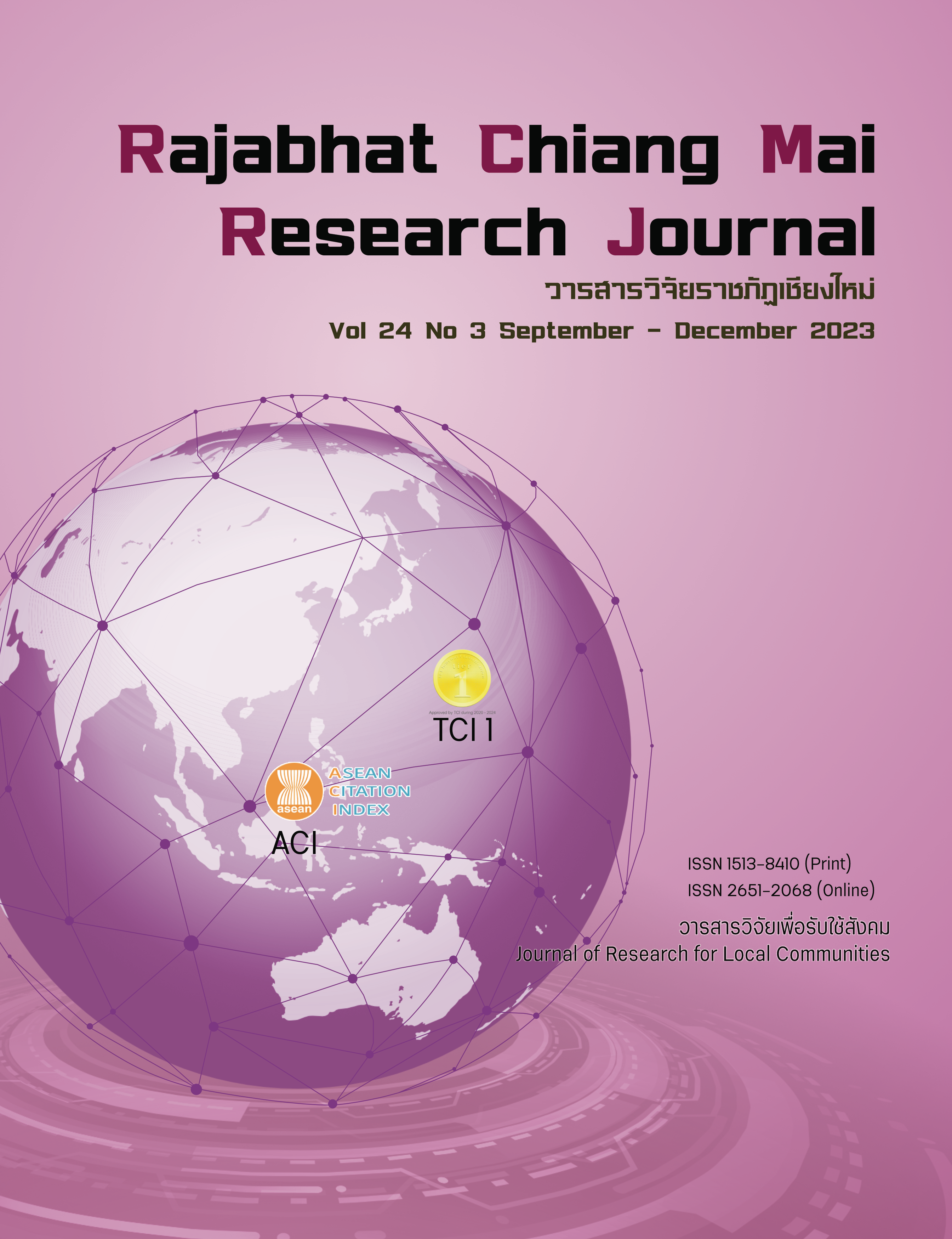Fostering Multicultural Competence in Primary School Students and Teachers through Participatory Media Production
DOI:
https://doi.org/10.57260/rcmrj.2023.263084คำสำคัญ:
Multicultural education, Multicultural competency, Participatory media production, Communicationบทคัดย่อ
This study examined the impact of participatory media production on developing multicultural competence in students and teachers at a diverse primary school. Participants included 32 fifth-grade students and three teachers actively engaged in activities targeting multicultural competence enhancement. The study employed a theoretical framework of participatory communication. Results indicated significant improvements in students' multicultural competence albeit with variations in individual growth levels. On average, students demonstrated intermediate-level growth, with attitudes exhibiting the highest progress, followed by knowledge and skills. Teachers also experienced growth in multicultural competency, with knowledge showing the most significant improvement, followed by attitudes and skills. Notably, there were variations in the level of development among the teachers. Overall, the study underscores the efficacy of participatory media production in fostering multicultural competency while acknowledging that the impact may vary among individuals, as evidenced by diverse growth levels observed among students and teachers.
Downloads
เอกสารอ้างอิง
Arphattananon, T. (2021). Multicultural schools: Thailand's education policy for multicultural society. Bangkok; Chulalongkorn university press. (In Thai)
Banks, J. A. (2010). Multicultural education: characteristics and goals. In J. A. Banks & C. A. M. Banks, (Eds.). Multicultural Education: Issues and Perspectives (7th ed.). John Wiley & Sons, Inc.
Campinha-Bacote, J. (2002). The process of cultural competence in the delivery of healthcare services: A model of care. Journal of transcultural nursing: official journal of the Transcultural Nursing Society, 13(3), 181–201. https://doi.org/10.1177/10459602013003003
Derman-Sparks, L., & Edwards, J. O. (2020). Anti-bias education for young children and ourselves (2nd ed.). National Association for the Education of Young Children.
Gay, G., & Howard, T. C. (2000). Multicultural teacher education for the 21st century. The Teacher Educator, 36(1), 1-16, DOI: 10.1080/08878730009555246
Hulsbosch, H. (2010). Multicultural education through arts-based learning and teaching. Multicultural Education Review, 2(2), 85-101, DOI: 10.1080/2005-615X.2010.11102876
Kaewthep, K. Communication for Social Change in Seminar Report on the Development of Community Media Plans in Four Regions, Page 2-7. 27-28 October 2001 at Sala Thai Room, Ambassador Hote Bangkok, 2001. (In Thai)
Kanjanawasee, S. (2009). Classical test theory. (6th ed.). .Bankok; Faculty of Education, Chulalongkorn University. (In Thai)
Ladlia, K. (2012), Literature-based teaching model for enhancing danguage Development in preschool students. Journal of Yala Rajabhat University, 1(1), p 11-20. (In Thai)
Lehman, C. L. (2017). Multicultural competence: A literature review supporting focused training for pre-service teachers teaching diverse students. Journal of Education and Practice, 8(10), 109-116. https://files.eric.ed.gov/fulltext/EJ1139702.pdf
Lister, P. (1999). A taxonomy for developing cultural competence. Nurse Education Today, 19, 313-318.
Manning, L. M., & Baruth, L. G.
(2004). Multicultural education of children and adolescents. Allyn and Bacon.
Nawarat, N. (2018). Multicultural EducationCritical Perspectives and Praxis in Schooling. Wanida karnpim limited partnership. (In Thai)
Pennock, P., & Schwartz, R. (2012). Using video clips to implement multicultural aspects of science and nature of science into a biological content course for Pre-Service Teachers: An Action Research Project. i.e.: inquiry in education, 3 (2), 1-32. https://files.eric.ed.gov/fulltext/EJ1171919.pdf
Phothisita, C. (2019). Science and art of qualitative research. (8th ed.). Chulalongkorn University Press. (In Thai)
Sarria-Sanz, C., Alencar, A., & Verhoeven, E. (2023). Using participatory video for co-production and collaborative research with refugees: critical reflections from the Digital Place-makers program. Learning, Media and Technology, DOI: 10.1080/17439884.2023.2166528
Satapitanon, P. (2006). Participatory Communication and Community Development: from Concept to Research Practice in Thai Society. Bangkok: The Thailand Research Fund. (In Thai)
Smith, A., Johnson, C., Powell, G., & Oliver, J. (2011). The relationship between multicultural service-learning and self-reported multicultural competencies in undergraduate students: A qualitative participatory action study. SCHOLE: A Journal of Leisure Studies and Recreation Education. 26, 1-13. DOI:10.1080/1937156X.2011.11949676
Spanierman, L. B., Oh, E., Heppner, P. P., Neville, H. A., Mobley, M., Wright, C. V., Dillon, F. R., & Navarro, R. (2011). The multicultural teaching competency scale: Development and initial validation. Urban Education, 46(3), 440-464. https://doi.org/10.1177/0042085910377442
Sue, D. W., & Sue, D. (2013). Counseling the culturally diverse: Theory and Practice (6th ed.). Wiley.
Yongyuan, B. (2010). Development of a model for multicultural education in primary school. Retrieved from: http://dric.nrct.go.th
ดาวน์โหลด
เผยแพร่แล้ว
รูปแบบการอ้างอิง
ฉบับ
ประเภทบทความ
สัญญาอนุญาต
ลิขสิทธิ์ (c) 2023 วารสารวิจัยราชภัฏเชียงใหม่

อนุญาตภายใต้เงื่อนไข Creative Commons Attribution-NonCommercial-NoDerivatives 4.0 International License.
1. บทความ ข้อมูล เนื้อหา รูปภาพ ฯลฯ ที่ได้รับการตีพิมพ์ใน “Community and Social Development Journal” ถือเป็นลิขสิทธิ์ของ Community and Social Development Journal มหาวิทยาลัยราชภัฏเชียงใหม่ และเพื่อให้เผยแพร่บทความได้อย่างเหมาะสมผ่านสื่อสิ่งพิมพ์และอิเล็กทรอนิกส์ ผู้เขียนยังคงถือครองลิขสิทธิ์บทความที่ตีพิมพ์ภายใต้ใบอนุญาต Creative Commons Attribution (CC BY) ซึ่งอนุญาตให้เผยแพร่บทความซ้ำในแหล่งอื่นได้ โดยอ้างอิงต้องอ้งอิงบทความในวารสาร ผู้เขียนต้องรับผิดชอบในการขออนุญาตผลิตซ้ำเนื้อหาที่มีลิขสิทธิ์จากแหล่งอื่น
2. เนื้อหาบทความที่ปรากฏในวารสารเป็นความรับผิดชอบของผู้เขียนบทความโดยตรง ซึ่งกองบรรณาธิการวารสารไม่จำเป็นต้องเห็นด้วยหรือร่วมรับผิดชอบใดๆ














